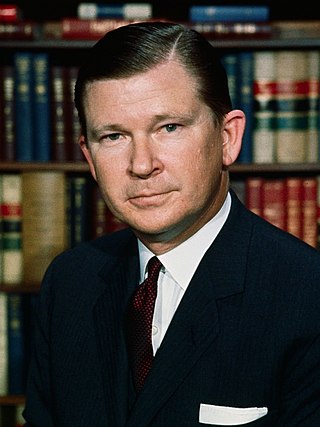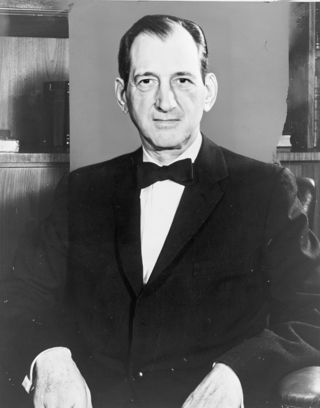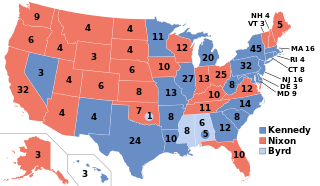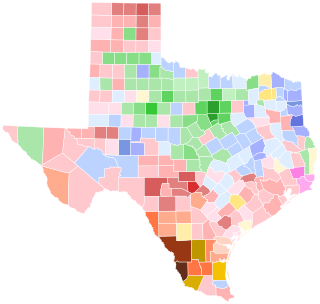
Lyndon Baines Johnson, often referred to by his initials LBJ, was an American politician who served as the 36th president of the United States from 1963 to 1969. He previously served as the 37th vice president from 1961 to 1963 under President John F. Kennedy, and was sworn in shortly after Kennedy's assassination. A Democrat from Texas, Johnson also served as a U.S. representative, U.S. Senator and the Senate majority leader. He holds the distinction of being one of the few presidents who served in all elected offices at the federal level.

Ralph Webster Yarborough was an American politician and lawyer. He was a Texas Democratic politician who served in the United States Senate from 1957 to 1971 and was a leader of the progressive wing of his party. Along with Senate Majority Leader Lyndon B. Johnson and Speaker of the House Sam Rayburn, but unlike most Southern congressmen, Yarborough refused to support the 1956 Southern Manifesto, which called for resistance to the racial integration of schools and other public places. Yarborough voted in favor of the Civil Rights Acts of 1957, 1960, 1964, and 1968, as well as the 24th Amendment to the U.S. Constitution, the Voting Rights Act of 1965, and the confirmation of Thurgood Marshall to the U.S. Supreme Court. Yarborough was the only senator from a state that was part of the Confederacy to vote for all five bills.

Samuel Taliaferro Rayburn was an American politician who served as the 43rd speaker of the United States House of Representatives. He was a three-time House speaker, former House majority leader, two-time House minority leader, and a 24-term congressman, representing Texas's 4th congressional district as a Democrat from 1913 to 1961. He holds the record for the longest tenure as Speaker of the United States House of Representatives, serving for over 17 years.

John Goodwin Tower was an American politician and military officer who represented Texas in the United States Senate from 1961 to 1985. He was the first Republican elected to the U.S. Senate from Texas since Reconstruction. Tower is known for leading the Tower Commission, which investigated the Iran-Contra Affair in the Reagan administration.

The 1964 United States Senate elections were held on November 3. The 33 seats of Class 1 were contested in regular elections. Special elections were also held to fill vacancies. They coincided with the election of President Lyndon B. Johnson by an overwhelming majority, to a full term. His Democratic Party picked up a net two seats from the Republicans. As of 2022, this was the last time either party has had a two-thirds majority in the Senate, which would have hypothetically allowed the Senate Democrats to override a veto, propose constitutional amendments, convict and expel certain officials, or invoke cloture without any votes from Senate Republicans. In practice, however, internal divisions effectively prevented the Democrats from doing so. The Senate election coincided with Democratic gains in the House in the same year.

The 1960 United States Senate elections coincided with the election of John F. Kennedy as president on November 8, 1960. The 33 seats of Class 2 were contested in regular elections. A special election was also held on June 28, 1960, for a mid-term vacancy in North Dakota. The Republicans gained two seats at the expense of the Democrats. However, Republican Senator-elect Edwin Keith Thomson of Wyoming died December 9, 1960, and was replaced by appointee Democratic John J. Hickey at the beginning of the Congress, reducing Republican gains to one seat.

William Arvis "Dollar Bill" Blakley was an American politician and businessman from the state of Texas. Blakley was part of the conservative wing of the Texas Democratic Party. He served twice as an interim United States Senator, appointed by the Governor to fill a vacancy until his successor could be duly elected. He served first in 1957 after the resignation of Price Daniel and again in 1961 after the resignation of Lyndon B. Johnson.

Albert Langston Thomas was a Democratic member of the U.S. House of Representatives for 29 years. From Houston, Texas, he was responsible for bringing the Johnson Space Center to Houston.

Electoral history of Lyndon B. Johnson, who served as the 36th president of the United States (1963–1969), the 37th vice president (1961–1963); and as a United States senator (1949–1961) and United States representative (1937–1949) from Texas.

Harry Cummings McPherson Jr. served as counsel and special counsel to President of the United States Lyndon B. Johnson from 1965 to 1969 and was Johnson's chief speechwriter from 1966 to 1969. McPherson's A Political Education, 1972, is a classic insider's view of Washington and an essential source for Johnson's presidency. A prominent Washington lawyer and lobbyist since 1969, McPherson was awarded American Lawyer magazine's Lifetime Achievement Award in 2008. He died February 16, 2012, in Bethesda, Maryland.

The 1960 United States elections was held on November 8, and elected the members of the 87th United States Congress. Democratic Senator John F. Kennedy narrowly defeated Republican incumbent Vice President Richard Nixon in the presidential election, and although Republicans made gains in both chambers of Congress, the Democratic Party easily maintained control of Congress.

The 1960 United States presidential election in Massachusetts took place on November 8, 1960, as part of the 1960 United States presidential election, which was held throughout all 50 states. Voters chose 16 representatives, or electors to the Electoral College, who voted for president and vice president.

The selection of the Democratic Party's vice presidential candidate for the 1960 United States presidential election occurred at the party's national convention on August 13, 1960. After winning the presidential nomination on the first ballot of the 1960 Democratic National Convention, Massachusetts Senator John F. Kennedy turned his attention to picking a running mate. Kennedy chose Senate Majority Leader Lyndon B. Johnson, who had finished second on the presidential ballot, as his running mate. Johnson, a Protestant Texan, provided geographical and religious balance to a ticket led by a Catholic Northeasterner, but many liberals did not like the pick. Many were surprised both that Kennedy made the offer and that Johnson accepted the offer, as the two had been rivals for the 1960 presidential nomination. According to some accounts, Kennedy had offered the position to Johnson as a courtesy and expected Johnson to decline the offer; when Johnson accepted, Kennedy sent his brother, Robert F. Kennedy, to talk Johnson out of accepting the offer. However, Kennedy may have made the offer in earnest due to Johnson's appeal in the south, Johnson's friendly relationship with Speaker of the House Sam Rayburn, and Kennedy's desire to remove Johnson as Senate Majority Leader in favor of the more liberal Mike Mansfield. Regardless, Johnson decided that accepting the offer would be better for his political career and better position himself to become president, and so he chose to become Kennedy's running mate. The Democratic convention confirmed Johnson as the vice presidential nominee, although the delegation from Washington, D.C. attempted to select Minnesota Governor Orville Freeman instead.

The Johnson desk is a mahogany partners desk that was used by U.S. President Lyndon B. Johnson in the Oval Office as his Oval Office desk. One of only six desks used by a president in the Oval Office, it was designed by Thomas D. Wadelton and built in 1909 by S. Karpen and Bros. in Chicago. The desk was built as part of 125 seven-piece office sets for senators' offices in the Russell Senate Office Building, and was used by Johnson during his terms as U.S. Senator, Vice President, and President. It is currently located at Lyndon Baines Johnson Library and Museum as part of a replica Oval Office.

The 1960 United States presidential election in Connecticut took place on November 8, 1960, as part of the 1960 United States presidential election, which was held throughout all 50 states. Voters chose eight representatives, or electors to the Electoral College, who voted for president and vice president.

The 1960 United States presidential election in Maine took place on November 8, 1960, as part of the 1960 United States presidential election, which was held throughout all 50 states. Voters chose five representatives, or electors to the Electoral College, who voted for president and vice president.

The 1960 United States presidential election in Rhode Island took place on November 8, 1960, as part of the 1960 United States presidential election, which was held throughout all 50 states. Voters chose four representatives, or electors to the Electoral College, who voted for president and vice president.

The 1961 United States Senate special election in Texas was held on May 27, 1961. The election was held to replace outgoing Senator Lyndon B. Johnson, who had been elected Vice President of the United States.

The 1960 United States Senate election in Texas was held on November 8, 1960. Incumbent Democratic U.S. Senator Lyndon Baines Johnson, who was simultaneously running for Vice President of the United States, was re-elected to a third term in office. Johnson had Texas law changed to allow him to run for both offices at once. As of 2023, this is the last time the Democrats won the Class 2 Senate seat in Texas.





















